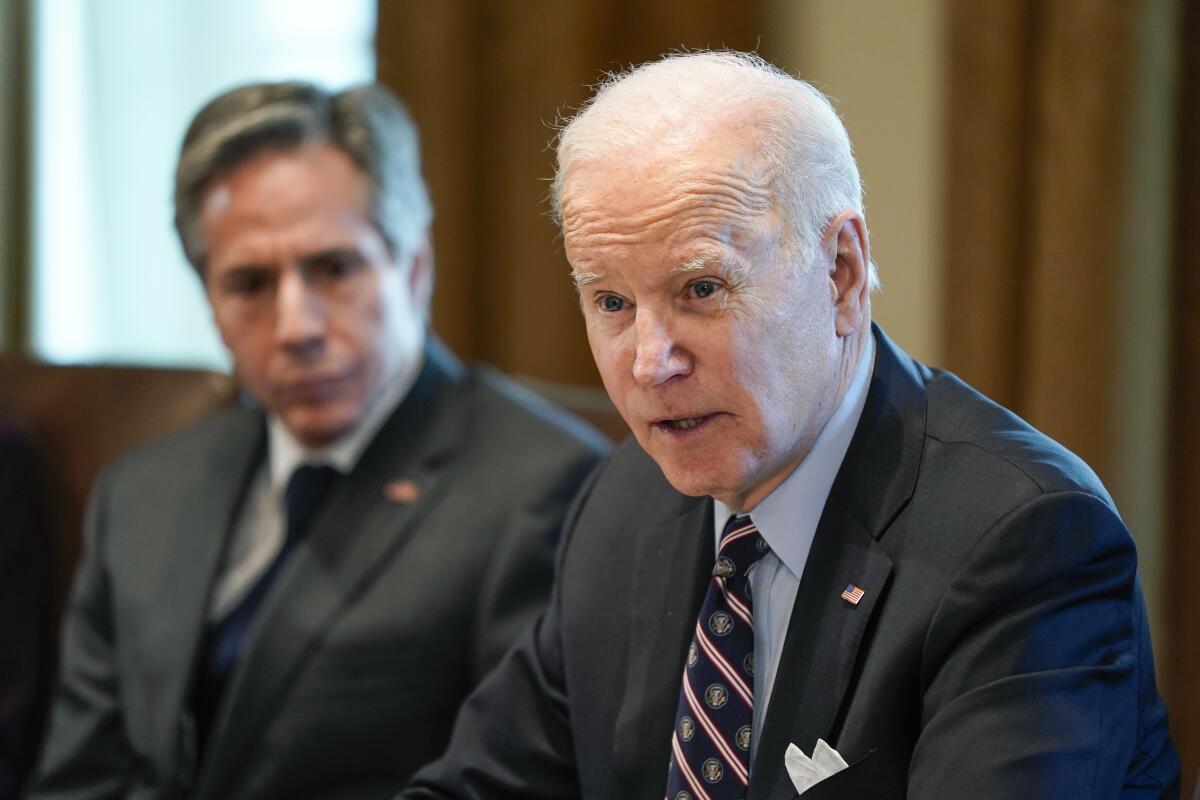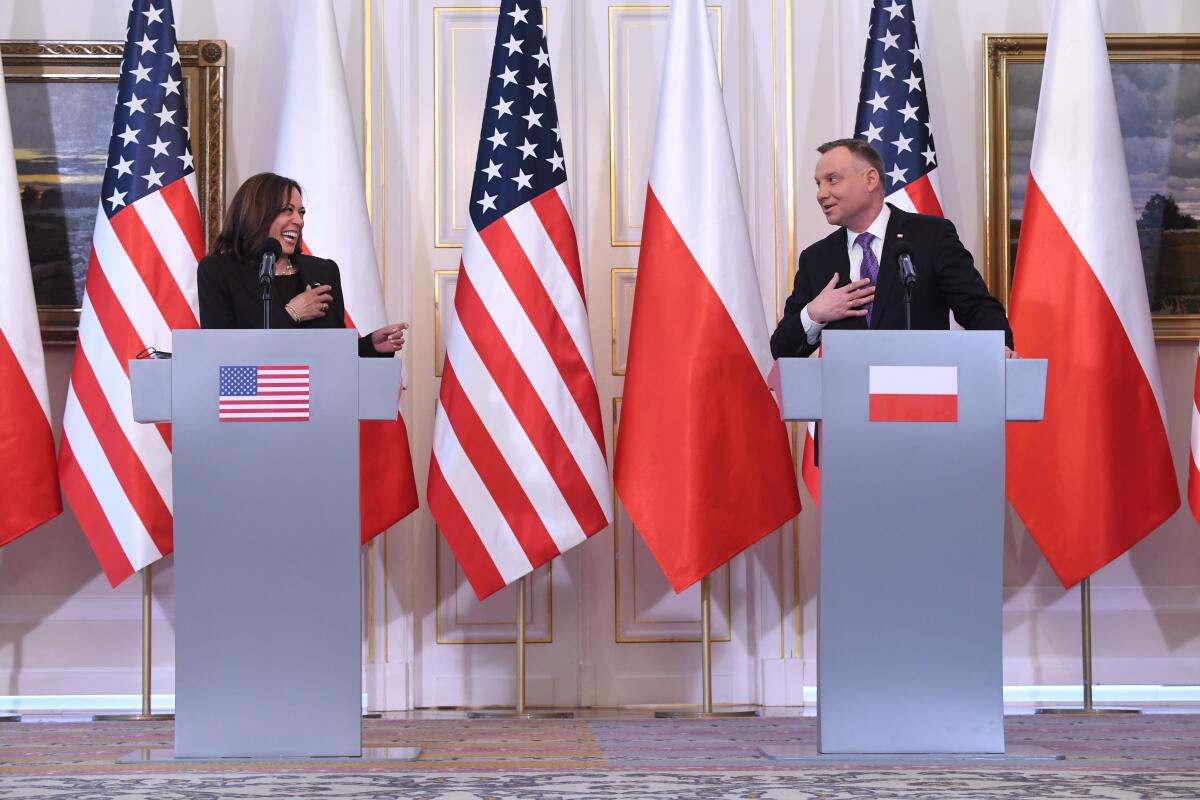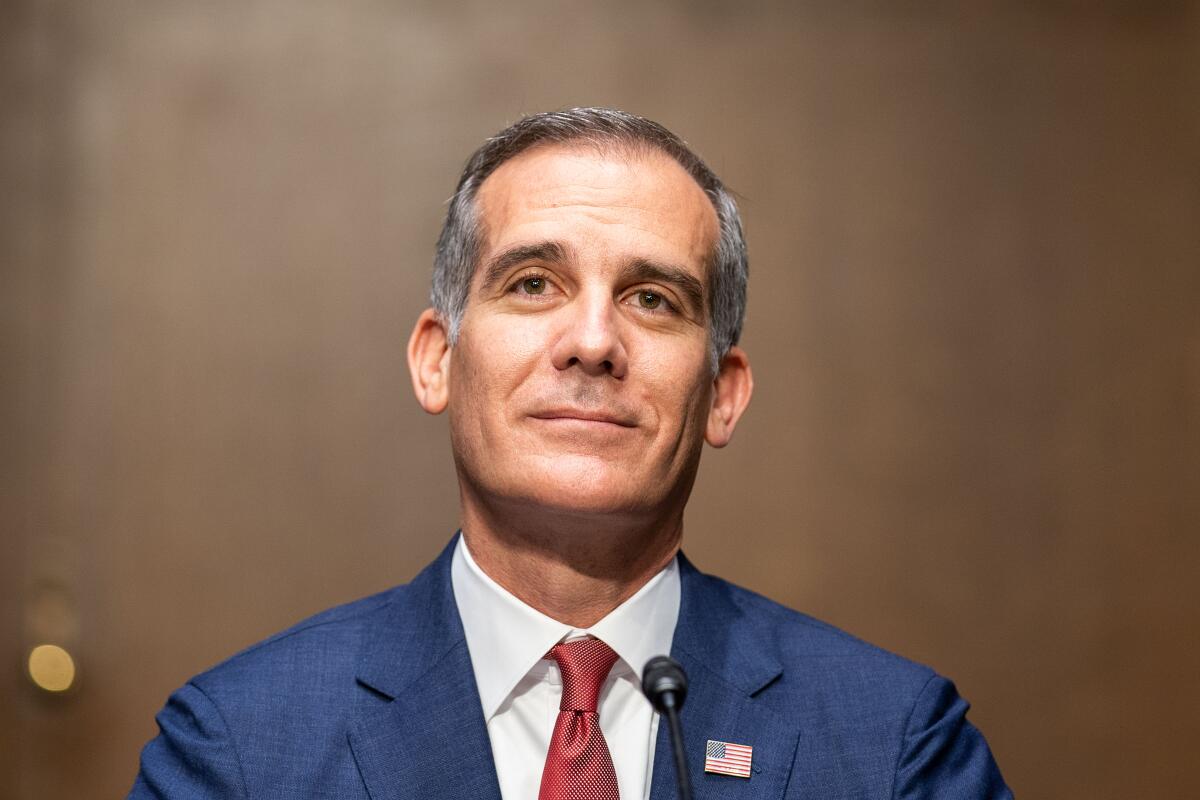Essential Politics: War in Ukraine scrambles GOP and Democratic strategies for midterms

- Share via
WASHINGTON — One constant from political figures in wartime is insistence that they’re not concerned about politics.
Nonsense, of course.
The domestic political impact of the war in Ukraine — now in its third week — has scrambled the two parties’ strategies going into this year’s midterm elections. Both have started to maneuver for advantage.
No one knows whether either side will benefit come November — a lot depends on how voters end up perceiving the war’s course.
But for President Biden and the Democrats, who have been tracking toward a significant defeat, attention to a foreign crisis could provide a badly needed shakeup of the campaign debate.
An overwhelming issue
“As a general rule, Americans don’t vote on foreign policy unless American men and women are dying in a war, but we’ve rarely had an international event not involving the United States directly that has so totally consumed our news and attention as the Russian invasion of Ukraine,” said Republican pollster and strategist Whit Ayres.
“This war has become symbolic for the survival of democratic regimes against authoritarian dictatorships,” Ayres added. “That symbolism has given it a much broader meaning.”
A poll this week by Navigator Research, a Democratic firm, found that 37% of American voters said they were “very closely” following news from Ukraine, and nearly 8 in 10 said they were following it at least somewhat closely — high numbers for a foreign issue.
National security and foreign policy had jumped to the top of American concerns, tied with jobs and the economy, displacing worries about the coronavirus and inflation, the poll found.
Get our L.A. Times Politics newsletter
The latest news, analysis and insights from our politics team.
You may occasionally receive promotional content from the Los Angeles Times.
Amid that intense focus, Americans have clearly picked a side — overwhelmingly favoring the Ukrainians. That could be seen in Wednesday’s House vote to suspend oil imports from Russia, which passed 414-17 with just two of the chamber’s most left-wing Democrats, Reps. Cori Bush of Missouri and Ilhan Omar of Minnesota, and 15 right-wing Republicans voting no.
That level of attention makes the Ukraine war the kind of event that could significantly shift U.S. politics.
“Politics isn’t the most important thing right now,” said Democratic strategist Steve Schale, chief executive of the pro-Biden super-pac Unite the Country.
But, he added, since 1992, “the only two midterm elections that were not absolute debacles for the incumbent president’s party were held during a window where there was something significant in the country that reshaped the conversation.”
Those two were 1998, when voters rejected Republican efforts to impeach President Clinton and Democrats gained four seats, and 2002, when Republicans under President George W. Bush gained seats in the aftermath of the Sept. 11, 2001, terror attacks.
Biden and the Democrats have a long way to go to emulate the midterm successes those two presidents enjoyed. A new Wall Street Journal poll released Friday continues to show Democrats trailing the GOP as the party voters say they expect to back in November.
But polls have also shown an uptick in voters’ assessments of how Biden is doing his job. The change is just a few percentage points, but after nine months of nearly steady decline, it’s a welcome sign for the president.
Ukraine has clearly contributed to the boost in Biden’s ratings. A poll by Morning Consult for Politico found this week, for example, that by 46% to 42%, voters approved of Biden’s response to the crisis.
Voters’ assessments of how Biden has dealt with Ukraine have improved notably since last month and are also significantly higher than how they assess his presidency overall.
The shift comes primarily from Democrats and independents; Republicans mostly remain highly critical of Biden. The Navigator poll, however, did identify a slice of Republicans, mostly moderately conservative men, who approve of Biden on Ukraine even as they disapprove of his performance otherwise.
In any case, winning back wavering partisans and independent voters is a key task for Biden right now, one that could be critical in the small number of swing House districts and Senate elections in which the midterms will be most intensely contested.
If voters continue to approve of Biden’s response, it could help with one of his key problems — the perception by many Americans that he’s not a strong leader.
For now, the war has provided Democrats with at least a talking point to use on one of their other problems — the inflation that has swept through the U.S. economy.
White House officials have worked overtime in recent days to blame Russian President Vladimir Putin for the increase in gasoline prices, labeling it “Putin’s price hike.”
So far, that message has shown some traction, at least with Democratic partisans. A poll released Wednesday by YouGov found that Democrats, by 59% to 10% blamed Putin rather than Biden for the price increases. Republicans heavily blamed Biden, while independents were closely divided.
Gas prices in the first nine months of Biden’s presidency rose from a nationwide average of $2.38 per gallon to $3.40, according to weekly data from the Energy Department. Since the Russian attack on Ukraine, prices nationwide have jumped to an average of $4.10, with more increases likely.
Large majorities of Americans say they support the administration’s decision to ban imports of Russian oil, although it’s anyone’s guess whether that support will persist as motorists continue to struggle with high prices.
The House vote to support the import ban reinforces the polling on another impact of the war — the degree to which Republicans have rejected former President Trump‘s favorable attitude toward Putin.
Two weeks ago, I wrote that initial reactions to the war had isolated Trump. That trend has only deepened.
“The brutality of Putin‘s assault has made the judgment of Putin’s apologists highly suspect,” said Ayres.
Trump has repeatedly complimented Putin, including referring to the Russian leader’s rationale for the invasion as “genius.”
A majority of Americans, including both Democrats and independents, although not Republicans, view Trump as “pro-Russia,” but see Biden and both parties in Congress as “pro-Ukraine,” the Navigator polling found.
The 15 Republicans who voted against the oil import ban included several of Trump’s most outspoken supporters, including Reps. Marjorie Taylor Greene of Georgia, Matt Gaetz of Florida, Lauren Boebert of Colorado, Paul Gosar of Arizona and Madison Cawthorn of North Carolina, who in recent remarks to supporters called Ukrainian President Volodymyr Zelensky a “thug.”
Elsewhere in the GOP, however, even party leaders who have strenuously avoided criticizing Trump, like House Minority Leader Kevin McCarthy of Bakersfield, have publicly split with his praise of Putin.
“I do not think anything’s savvy or genius about Putin,” McCarthy said Wednesday when asked about Trump’s comments.
Neither McCarthy nor the vast majority of Republican elected officials have explicitly criticized the former president, but Ukraine could emerge as an election liability for some of his acolytes.
The first overt sign of that came this week in North Carolina, where former Gov. Pat McCrory aired the first ad of his campaign for the party’s Senate nomination. The spot attacked his chief opponent, Rep. Ted Budd, for being soft on Putin.
The ad features a clip from a television interview in which Budd called Putin a “very intelligent actor.”
“These are serious times and we need serious senators,” McCrory says in the ad. “I don’t compliment our enemies.”
That was the first such use of Ukraine in a political attack in the current campaign year, but “if the dynamics continue on this same track,” said Ayres, it almost surely will not be the last.
Harris in Eastern Europe

As Vice President Kamala Harris visited Poland on Thursday, Tracy Wilkinson and Noah Bierman looked at how that country is coping with the impact of the war in neighboring Ukraine.
Speaking in Warsaw, Harris said that Russia’s bombing of a civilian hospital in Ukraine should be investigated as a potential war crime, becoming the highest-level U.S. official to condemn the attack, Bierman reported.
In Washington, senators pressed intelligence officials about why the administration will not facilitate the transfer of Soviet-era MiG fighter planes from Poland to Ukraine, Sarah Wire reported.
“We’re in a very challenging position, where we are obviously providing enormous amounts of support to Ukraine as we should and need to do, but at the same time trying not to escalate the conflict into a full-on NATO or U.S. war with Russia,” Director of National Intelligence Avril Haines told the senators.
Our daily news podcast
If you’re a fan of this newsletter, you’ll love our daily podcast “The Times,” hosted every weekday by columnist Gustavo Arellano, along with reporters from across our newsroom. Go beyond the headlines. Download and listen on our App, subscribe on Apple Podcasts and follow on Spotify.
Jan. 6 investigation
The federal government so far has brought 757 cases against people for crimes around the Jan. 6, 2021, attack on the U.S. Capitol, including 51 Californians. Of those, 225 have pleaded guilty. The remaining defendants are largely in a holding pattern, with about 65 being held in custody, mostly accused of assaulting police officers. As Sarah Wire reported, the process has gone slowly in part because of the massive amount of evidence amassed in the investigation — 250 terabytes of data, roughly the equivalent of 32.5 million digital photos or 500,000 hours of audio recordings.
A federal judge on Wednesday handed an incremental victory to the congressional panel investigating the Jan. 6 insurrection in a case involving California attorney John Eastman. As Melanie Mason reported, Eastman, who advised Trump on his efforts to overturn the results of the 2020 presidential election, has been fighting to prevent the committee from seeing more than 100 emails involving him. The judge rejected Eastman’s blanket claim that his emails were shielded by attorney-client privilege and related rules. Instead, he’ll review 111 emails and decide which can be released.
Enjoying this newsletter? Consider subscribing to the Los Angeles Times
Your support helps us deliver the news that matters most. Become a subscriber.
The latest from Washington
Inflation surged in February to a new four-decade high with the cost of gasoline and other consumer goods and services climbing at an accelerating pace. As Eli Stokols and Don Lee reported, rising costs remain a top issue for the White House, which is trying to blunt Republican attacks.
The White House plans to impose new sanctions on North Korea over two recent missile tests that the administration has concluded were clandestine attempts to evaluate Pyongyang’s ICBM capabilities, Stokols reported.
The House on Wednesday approved a $1.5-trillion spending bill to keep the government’s doors open for the next six months as well as send $13.6 billion in humanitarian and military aid to Ukraine, Jennifer Haberkorn reported. The bill includes more than $4 billion to assist Ukraine and others in Eastern Europe grappling with the millions of refugees displaced by the war. The Senate passed the bill Thursday, 68-31. Biden is expected to sign it into law as early as Friday.
Biden announced Thursday that he will name Colombia as a major non-NATO ally, a significant recognition as the United States tries to undercut Russian President Vladimir Putin’s influence in Latin America after his invasion of Ukraine. As Wilkinson and Erin Logan reported, the special status has been given to only two other Latin American nations — Argentina and Brazil — and signals a close relationship between the United States and countries not part of the North Atlantic Treaty Organization.
The governing board that oversees security improvements to the U.S. Capitol refused to disclose to a government watchdog what improvements are being made after rioters were able to smash windows and enter the building Jan. 6, 2021, according to a watchdog report being released Thursday, Wire reported.
The latest from California

Sen. Charles Grassley (R-Iowa) wants to delay a Senate vote on Los Angeles Mayor Eric Garcetti’s nomination to become ambassador to India so allegations that Garcetti ignored sexual harassment in his office can be more fully investigated, Dakota Smith reported.
“I have received numerous credible allegations from multiple whistleblowers alleging that Mr. Garcetti, while mayor of Los Angeles, had knowledge of sexual harassment and assaults allegedly committed against multiple city employees and their associates by his close advisor, and that he ignored the misconduct,” Grassley said in a statement.
Garcetti’s office released a statement saying the mayor “has testified under oath multiple times, including before the U.S. Senate, and stands by his testimony unequivocally: He absolutely did not witness nor was he informed of any of the behavior being alleged.”
With violent crime in Los Angeles near a decade high, several leading candidates for mayor are campaigning on promises to put more police officers on the streets, Kevin Rector and Ben Oreskes reported. But fulfilling such promises won’t be easy, in part because of an administrative bottleneck in the hiring process that has throttled recruitment since the COVID-19 pandemic began.
The war in Ukraine is also emerging as an issue in some local races in Los Angeles, where the Democratic Socialists of America are backing challengers to incumbent City Council members Mitch O’Farrell and Gil Cedillo.
After the Russian invasion of Ukraine, the L.A. chapter of the DSA released a statement calling on the U.S. to cut ties with NATO and denouncing what it called U.S. “imperialist expansionism that set the stage for this conflict.” As David Zahniser reported, O’Farrell, in particular, is using that statement to attack his challenger, Hugo Soto-Martinez, who says he disagrees with the call to quit NATO.
Finally, Mark Barabak’s latest column looks at how big money has roiled the politics of a small city. The city is Benecia, in the Bay Area. The money is mostly from Valero, the big oil refining company that is the city’s largest employer. And the target has been Steve Young, the city’s 70-year-old mayor. It’s a cautionary tale about money, politics and the decline of local news coverage.
Sign up for our California Politics newsletter to get the best of The Times’ state politics reporting.
Stay in touch
Keep up with breaking news on our Politics page. And are you following us on Twitter at @latimespolitics?
Did someone forward you this? Sign up here to get Essential Politics in your inbox.
Until next time, send your comments, suggestions and news tips to politics@latimes.com.
Get the L.A. Times Politics newsletter
Deeply reported insights into legislation, politics and policy from Sacramento, Washington and beyond. In your inbox twice per week.
You may occasionally receive promotional content from the Los Angeles Times.




